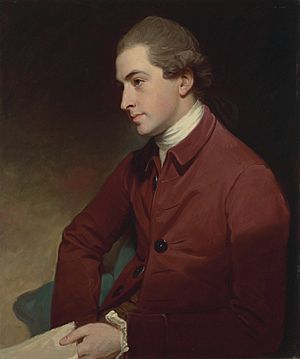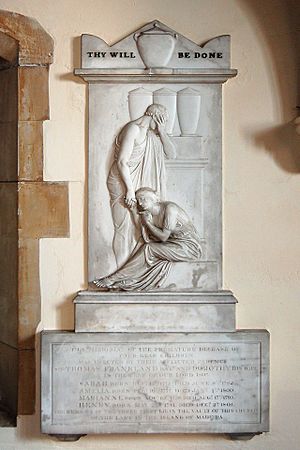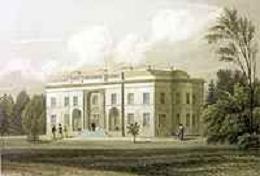Sir Thomas Frankland, 6th Baronet facts for kids

Sir Thomas Frankland (born September 1750 – died January 4, 1831) was an important English landowner from Thirkleby, Yorkshire. He was also a politician who served in the House of Commons (the UK Parliament) for several years. Beyond politics, he was a famous botanist, someone who studies plants. In fact, a type of plant, the genus Franklandia, was named after him!
Contents
Sir Thomas Frankland's Early Life
Sir Thomas was born in London in September 1750. He was the oldest son of Admiral Sir Thomas Frankland, 5th Baronet and his wife, Sarah Rhett. He went to Eton College, a well-known school, from 1761 to 1767. After that, he studied at Merton College, Oxford starting in 1768. He earned his master's degree in 1771.
His Love for Nature
In 1772, Sir Thomas began studying law at Lincoln's Inn. However, he was truly passionate about nature. He was an excellent naturalist, especially interested in botany (the study of plants) and floristry (the study of flowers). Because of his knowledge, he became a Fellow of the Royal Society in 1773. This is a very respected group for scientists. He also knew a lot about British sports. On March 7, 1775, he married his cousin, Dorothy Smelt.
A Life in Politics
Sir Thomas Frankland became a Member of Parliament (MP) for Thirsk in 1774. He was elected without anyone running against him, alongside his father. He did not run for election again in 1780. During his first time in Parliament, it seems he did not give any speeches.
Inheriting a Legacy
In 1784, Sir Thomas's father passed away. Sir Thomas then became the 6th Baronet and inherited Thirkleby Hall near Thirsk. He didn't inherit a lot of money, but he did get control over two parliamentary seats for Thirsk. These seats were very valuable at the time, worth a lot of money.
In 1790, Sir Thomas hired a famous architect, James Wyatt, to rebuild Thirkleby Hall. He also served as the High Sheriff of Yorkshire from 1792 to 1793. This was an important local role.
Turning Down an Offer
In 1796, William Pitt the younger, who was a very important politician, offered Sir Thomas a special title called a "peerage." In return, Pitt wanted Sir Thomas to give up his two parliamentary seats in Thirsk. But Sir Thomas said no! He chose to keep his seats and was re-elected as MP for Thirsk in 1796. He stayed in Parliament until 1801. After that, his brother, William, took over the seat.
Later Years and Memorial
Sir Thomas Frankland passed away at Thirkleby Hall in 1831. He and his wife, Dorothy, had five children. Sadly, only one of them, his heir Sir Robert Frankland, 7th Baronet, lived to adulthood.

There is a beautiful memorial for four of their children in All Saints Church, located in Great Thirkleby. This memorial was created by the famous sculptor John Flaxman R.A.
After the First World War, the Thirkleby estate was sold off in pieces. However, the hall itself was not sold. It was taken apart in 1927.
 | Madam C. J. Walker |
 | Janet Emerson Bashen |
 | Annie Turnbo Malone |
 | Maggie L. Walker |


